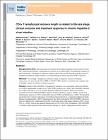| dc.contributor.author | FLETCHER, JEAN | |
| dc.date.accessioned | 2010-12-15T15:27:32Z | |
| dc.date.available | 2010-12-15T15:27:32Z | |
| dc.date.issued | 2010 | |
| dc.date.submitted | 2010 | en |
| dc.identifier.citation | Hoare M, Gelson WT, Das A, Fletcher JM, Davies SE, Curran MD, Vowler SL, Maini MK, Akbar AN, Alexander GJ., CD4+ T-lymphocyte telomere length is related to fibrosis stage, clinical outcome and treatment response in chronic hepatitis C virus infection., Journal of Hepatology, 53, 2, 2010, 252 - 260 | en |
| dc.identifier.other | Y | |
| dc.identifier.uri | http://hdl.handle.net/2262/47976 | |
| dc.description | PUBLISHED | en |
| dc.description.abstract | BACKGROUND & AIMS: Increasing age is associated with impaired immune function and in chronic HCV infection specifically, with progressive fibrosis, liver failure, HCC and impaired responses to antiviral therapy. T-lymphocyte telomere length declines with age. We hypothesised that shorter T-lymphocyte telomere length would be associated with poor clinical outcome in HCV infection.
METHODS: Circulating T-lymphocyte telomere length, an objective measure of immune senescence, was measured by flow-FISH in 135 HCV-RNA-positive, treatment-naive patients and 41 healthy controls in relation to clinical outcome.
RESULTS: Shorter CD4+CD45RO+ T-lymphocyte telomeres were associated with severe fibrosis (p=0.003), independent of male sex (p=0.04), CMV positivity (p=0.003), previous HBV infection (p=0.007), and age (p=ns) in viraemic patients compared to controls. There were inverse correlations between CD4+CD45RO+ telomere length and fibrosis stage (p<0.001), portal tract inflammatory grade (p=0.035), prothrombin time (p<0.001) and bilirubin (p=0.001). One hundred and twenty-four viraemic individuals were followed prospectively to a composite endpoint of death, hepatic decompensation or HCC. Independent of age, those with shorter CD4+CD45RO+ telomeres were less likely to be complication free after 2-years than those with longer telomeres (86% versus 96%, p=0.009) with an age-adjusted hazard ratio of 0.93 (0.90-0.96). In addition, CD4+CD45RO+ telomere length predicted successful antiviral therapy (p=0.001) independent of other factors.
CONCLUSIONS: CD4+ T-lymphocyte telomere length, independent of age, was related to inflammatory grade, fibrosis stage, laboratory indices of severity, subsequent hepatic decompensation and treatment outcome in patients with chronic HCV infection. | en |
| dc.description.sponsorship | M.H.: Wellcome Trust Clinical Research Training Fellow. W.G.: British Transplantation
Society Research Fellow. A.D.: MRC Ph.D. student. The Frank Litchfield Charitable Trust
and the Addenbrooke?s Hepatology Endowment Fund provided support for consumables.
Roche pharmaceuticals provided an unconditional educational grant. The funders had no role in study design, data collection and analysis, decision to publish, or preparation of the
manuscript. | en |
| dc.format.extent | 252 | en |
| dc.format.extent | 260 | en |
| dc.language.iso | en | en |
| dc.publisher | Elsevier | en |
| dc.relation.ispartofseries | Journal of Hepatology; | |
| dc.relation.ispartofseries | 53; | |
| dc.relation.ispartofseries | 2; | |
| dc.rights | Y | en |
| dc.subject | Immunology | en |
| dc.subject | Hepatitis C | en |
| dc.subject | Telomere | en |
| dc.subject | T-lymphocyte | en |
| dc.title | CD4+ T-lymphocyte telomere length is related to fibrosis stage, clinical outcome and treatment response in chronic hepatitis C virus infection. | en |
| dc.type | Journal Article | en |
| dc.contributor.sponsor | Wellcome Trust | en |
| dc.type.supercollection | scholarly_publications | en |
| dc.type.supercollection | refereed_publications | en |
| dc.identifier.peoplefinderurl | http://people.tcd.ie/fletchj | |
| dc.identifier.rssinternalid | 69984 | |
| dc.identifier.rssuri | http://dx.doi.org/10.1016/j.jhep.2010.03.005 | en |




